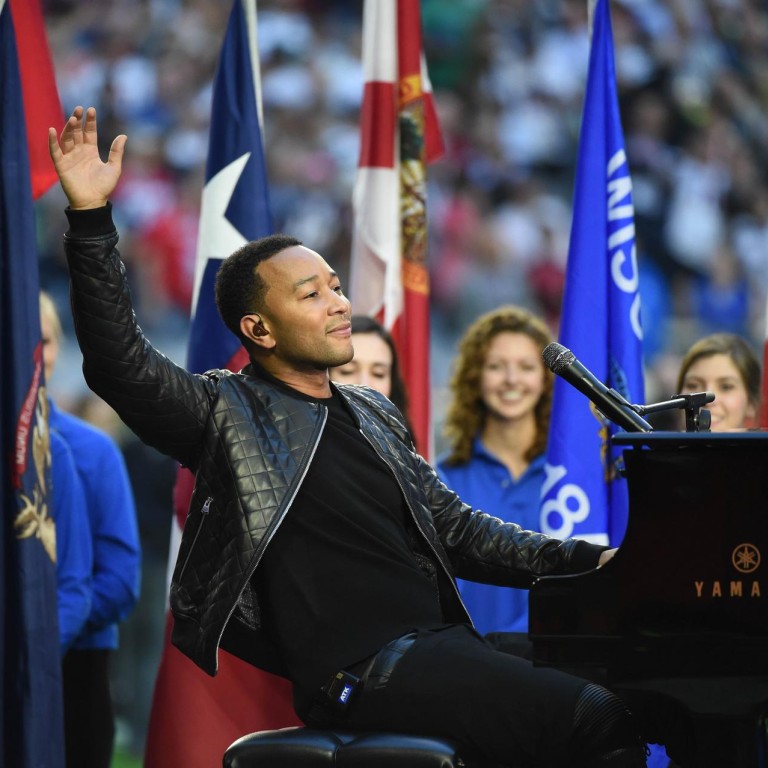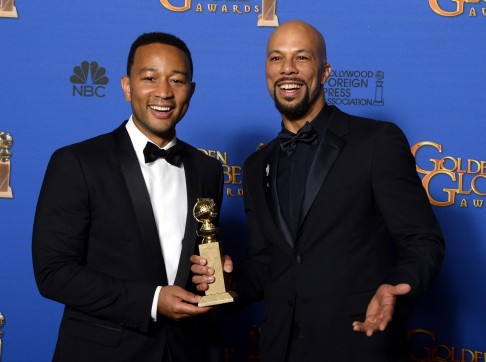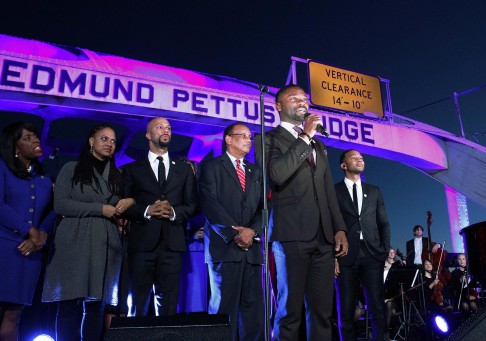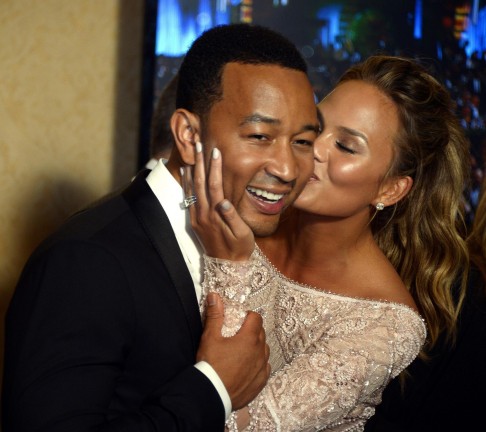
John Legend goes from love song All of Me to Selma soundtrack protest song Glory
John Legend is contributing to the community by highlighting social problems in his songs, the pianist tells Lorraine All
John Legend navigates through an obstacle course of Hollywood industry folk - photographers, a publicist, celebrity handlers, a model - in the kitchen and living room of his Hollywood Hills home. The model is his wife, Chrissy Teigen, but the rest are here to document and/or handle a recent uptick of interest around the low-key singer.
, a love song turned pop hit that he wrote for Teigen, was nominated for (but did not win) a solo performance Grammy. , a number Legend created with rapper Common for civil rights-era film , is up for an original song Oscar. "Love and social protest - I know, it's an interesting mix," the singer says with a laugh.
is Legend's first No1 song on the Billboard Hot 100 charts, while has won the original song Golden Globe and is becoming an anthem of sorts for equal rights protesters after the recent killings of unarmed black men by police.
Despite the new round of attention a decade into his career as a solo artist, the pianist (whose real name is John Stephens) appears unfazed by the chaos around him. He walks past the promotional bustle in his relatively modest home, finally settling down outside on a quiet deck overlooking Mulholland Drive.

Of his move between top-10 hits and gospel-inspired protest songs, the 36-year-old Legend says: "Doing both is in the tradition of artists I've grown up listening to, like Stevie Wonder, Marvin Gaye and Nina Simone. They made beautiful romantic songs but also made really great protest songs. I don't think it's incompatible for an artist to be able to do both."
, Legend's understated 2004 debut, brought contemplative and emotive songwriting back to a contemporary music world flooded with cotton-soft boy bands and bling-heavy hip hop. Signed and produced by Kanye West, Legend was able to cross over between different music camps - teaming with Jay-Z one minute, Sergio Mendes the next.
They only want to talk about race when it has the patina of nostalgia, and MLK when there’s a sense of deification. They don’t want to talk about race right now because it’s uglier to deal with
While singing eloquently about the various stages of hooking up (lust, love, infidelity, break-up), he was also campaigning for President Barack Obama and, more recently, wore the Ferguson slogan of protest, "Don't Shoot", onstage at the Hollywood Bowl. Legend and Teigen also paid for food trucks to feed protesters in New York following the choking death of Eric Garner by police in Staten Island.
His strong stance on polarising social issues does, of course, come with the expected blowback.
Legend most recently raised hackles for the lyrics in , which connect yesterday's struggle for civil rights to today's continued push for equality. "Even mentioning Ferguson [in the song], I caught flak from people on Twitter," he says.

"They said this song would have been great if you didn't mention Ferguson. They only want to talk about race when it has the patina of nostalgia, and MLK when there's a sense of deification. They don't want to talk about race right now because it's uglier to deal with. We weren't afraid to talk about what's happening today."
Legend contends that since Hollywood often deals with painful issues of race in a historical light, it's imperative to bring the discussion to the present. His and Common's recent acceptance speech at the Golden Globes continued that idea, as Legend thanked those "out there fighting for justice right now".
"We had to say what we said. [] is a special film and it has a special meaning. Look at the Voting Rights Act - the central law we were trying to pass in that film - they're now being rolled back, with new laws going into place that try to limit people's rights to vote," he says.
"All of this is so relevant now, so for us not to talk about it … and only look at it with nostalgia, would be betraying the spirit of the film."

Legend is co-producing his own film dealing with race in America, a documentary called slated for release on HBO in late spring. He has more documentaries and a feature film project in the works. "Yeah, I like to keep busy."
The singer grew up in Springfield, Ohio, steeped in gospel music, attending church several times a week where his grandfather was the pastor, his grandmother the church organist, his mother the choir director, and his father taught Sunday school and played the drums. After his grandmother died, he started playing the piano. "I'm not religious," he says. "I don't attend church anymore, but gospel is influential in everything I do as a musician still."
After graduating from the University of Pennsylvania, he got his first big break playing piano on what would be considered one of the best hip-hop albums ever made: Lauryn Hill's (Legend played on ). West eventually signed Legend to his GOOD Music label, and the rapper still produces Legend's albums.
is the singer's most successful song to date, and the ballad has since been reworked into a club fixture with several remixes. It was released just before his 2013 marriage in Italy to Teigen, a former swimsuit model. Since their union, he's become minor tabloid fodder, but the bigger concern for Legend is that his lyrics may be interpreted now as more biographical than universal.
"With all the attention since we've gotten married, are people going to think everything I write about a relationship is specifically about what we're going through at the moment?" he says.
"I don't want that to be the case because it would limit what my songs mean. I want to still be free in what I write about."
